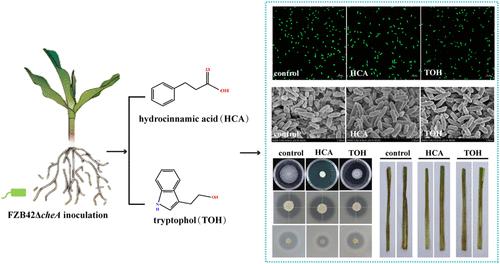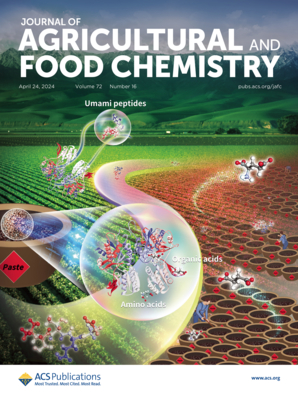根分泌物介导玉米芽孢杆菌FZB42的非定殖生物防治
IF 6.2
1区 农林科学
Q1 AGRICULTURE, MULTIDISCIPLINARY
引用次数: 0
摘要
芽孢杆菌接种剂通常因定植不良而表现出不稳定的性能,因此探索与定植无关的生物防治机制至关重要。虽然根际微生物群落和根分泌物影响植物的抗病性,但尚不清楚这些变化是否取决于芽孢杆菌的定植。本研究分析了玉米芽孢杆菌FZB42和定殖缺陷突变体FZB42ΔcheA对根际细菌群落和根分泌物的影响。两种处理均显著改变了根系分泌物成分。值得注意的是,氢肉桂酸和色氨酸在FZB42和ΔcheA处理中均上调了50倍以上,证实了它们增强了玉米对Dickeya zeae的抗性。这些化合物显著降低了玉米D. zeae的致病性,而对细菌存活的影响很小。此外,接种FZB42和ΔcheA突变体降低了细菌群落多样性,同时增加了蓝藻和偶氮螺旋菌等有益菌的丰度,从而间接增强了玉米的抗性。本研究为芽孢杆菌非定殖生物防治机制提供了新的认识。本文章由计算机程序翻译,如有差异,请以英文原文为准。

Root Exudates Mediate Bacillus velezensis FZB42’s Colonization-Independent Biocontrol in Maize
Bacillus inoculants often show unstable performance due to poor colonization, making it crucial to explore colonization-independent biocontrol mechanisms. While rhizosphere microbial communities and root exudates influence plant disease resistance, it remains unclear if these changes depend on Bacillus colonization. This study analyzed the rhizosphere bacterial community and root exudates of maize in response to Bacillus velezensis FZB42 and the colonization-defective mutant FZB42ΔcheA. Both treatments significantly altered the root exudate composition. Notably, hydrocinnamic acid and tryptophol, which were upregulated more than 50-fold in both FZB42 and ΔcheA treatments, were confirmed to enhance maize resistance against Dickeya zeae. These compounds significantly reduced the pathogenicity of D. zeae with minimal effects on bacterial survival. Moreover, inoculation with FZB42 and the ΔcheA mutant reduced bacterial community diversity while increasing the abundance of beneficial bacteria, such as Cyanobacteria and Azospirillum, thereby indirectly enhancing maize resistance. This study offers a new understanding of the colonization-independent biocontrol mechanisms of Bacillus spp.
求助全文
通过发布文献求助,成功后即可免费获取论文全文。
去求助
来源期刊
CiteScore
9.90
自引率
8.20%
发文量
1375
审稿时长
2.3 months
期刊介绍:
The Journal of Agricultural and Food Chemistry publishes high-quality, cutting edge original research representing complete studies and research advances dealing with the chemistry and biochemistry of agriculture and food. The Journal also encourages papers with chemistry and/or biochemistry as a major component combined with biological/sensory/nutritional/toxicological evaluation related to agriculture and/or food.

 求助内容:
求助内容: 应助结果提醒方式:
应助结果提醒方式:


